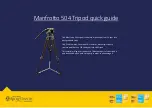
9/6/2006
4
4.3 Opening levers:
After unscrewing and pulling out the pressure release plug, the lid can be opened. To
overcome the friction of opening, use lever (Fig. 2) to push against the lid with a cam action.
Be sure they are inserted all the way flat to the housing before turning to avoid damaging the
protrusions on the lid. The body has four holes on each corner edges for opening. Gently
lever off the lid with the supplied opening lever (Fig. 3) taking care not to twist the lid
excessively. The lid should be opened keeping it approximately paralleled to the body at all
times, turn first one corner a little, then the other a little, and repeat again until the lid is
opened. Remember to unscrew and pull out the pressure release plug all the way first,
otherwise the air pressure will resist attempts at opening. Lay the lid on a flat stable surface
after opening.
(Fig. 2) Opening lever
(Fig. 3) Turn to open
4.4 Special note on responsibility for watertight integrity:
Each housing is individually inspected and hydrostatically tested in the factory. The
design of the main piston O-ring seal is among the most reliable in the industry and the
watertight integrity is excellent. This special O-ring design provides a perfect seal even if
there is any movement between the body and lid due to change of ambient pressure.
However please note that responsibility for ensuring the integrity of the watertight seal lies
entirely with the user.
10 BAR accepts no liability for damage to, or loss of any equipment
used with, or placed inside the housing. Users are highly recommended to carry out in-water
test of the housings without installing of the camera for their first dive after change of new
ports or alternation of any new configuration. The test can be carried out by lowering the
housing with ballast to the working depth or dive down to the safe diving range.
The O-ring seal is the main barrier between the water outside and the air
space within the camera. It is an effective barrier only if the seal is properly
maintained. The O-ring seal should be inspected before every dive. The following
information is provided for your guidance in using and maintaining the O-ring seal.






























